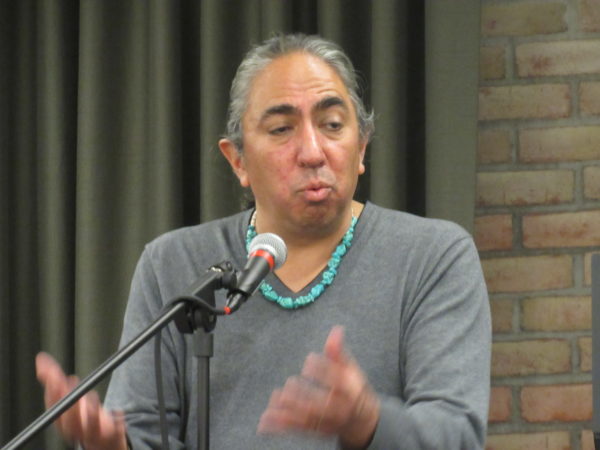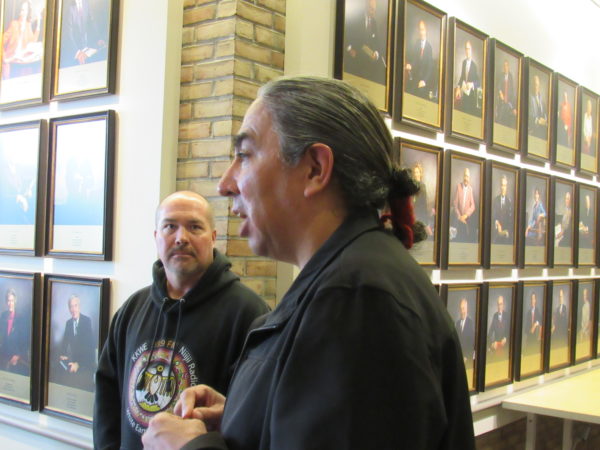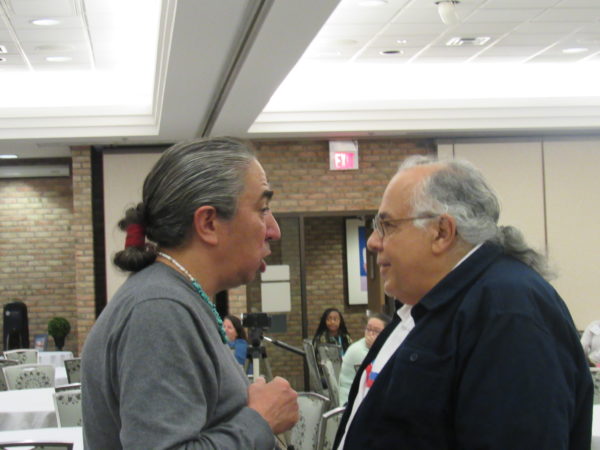
- Details
- By Levi Rickert
GRAND RAPIDS, Mich. — Independent presidential candidate Mark Charles (Navajo) stopped by to give a short speech at the opening reception of the Michigan Indian Education Council’s 2020 Native American Critical Issues Conference at Grand Valley State University in Grand Rapids, Mich. last Thursday afternoon.
During the beginning of his speech, he acknowledged he was on the ancestral land of the People of the Three Fires: the Chippewa, Ottawa and Potawatomi. He told conference attendees he likes to stop by to show respect and honor to the local American Indian community before he goes campaigns to non-Native people.
 Mark Charles talking to Michigan Indian Education Council
Mark Charles talking to Michigan Indian Education Council
(MIEC board members. Dr. Martin Reinhardt, president of the MIEC, in the background.)
Charles arrived in Grand Rapids from Chicago after partaking in a forum at Chicago Hilton on Wednesday evening where some 20 independent presidential candidates participated.
He says he is the first Native American to run as an independent. He mentioned late Russell Means, a leader of the American Indian Movement, who ran for president of the United States as part of the Libertarian Party in the late 1980s.
Charles has built his presidential run around the theme “we the people” that should be inclusive of all the people. He referenced the extensive research he has done on the Doctrine of Discovery that resulted in a book entitled, Unsettling Truths: The Ongoing, Dehumanizing Legacy of the Doctrine of Discovery.
He also mentioned the epidemic of murdered and missing Indigenous women and girls that is prevalent in Indian Country. He said he attended The Frank LaMere Native American Presidential Forum in Sioux City, Iowa last August, where leaders of Native nations asked every presidential candidate what they would do to solve this problem.
Among the presidential candidates present last August were Bernie Sanders, Elizabeth Warren and Kamala Harris. They said they would create a law to protect Indigenous women and girls.
Charles said he told Native leaders:
“When your Declaration of Independence refers to Natives as savages and your Constitution never mentions women, you should not act surprised when your Indigenous women go missing or get murdered. A new law will not fix this problem. We need a new basis for our laws.”
On Thursday, Charles said this country needs a national dialogue on race, gender and class.
“We need a conversation I would put on par with the Truth and Reconciliation Commissions such as what happened in South Africa, Rwanda, and Canada. However, I would not call it reconciliation because that word implies there was previously harmony, which is inaccurate. I would call it truth and “conciliation” because conciliation is merely the resolution of disputes. Reconciliation perpetuates the myth we were once great.”
 Mark Charles with longtime Michigan Indian leader Frank Ettawageshik.
Mark Charles with longtime Michigan Indian leader Frank Ettawageshik.
Charles asked: “How can you reconcile stolen lands and broken treaties. Slavery and Jim Crow laws, mass incarceration, families be ripped apart at the border?”
Charles left the conference to fly on an early flight to Portland, Ore. to spread the message that we the people should include all the people.
More Stories Like This
Native News Weekly (August 25, 2024): D.C. BriefsNavajo Nation Mourns the Passing of Former Vice President Rex Lee Jim
Deb Haaland Earns Endorsement From Communications Workers of America Local 7076
University Soccer Standout Leads by Example
Two Native Americans Named to Democratic Congressional Campaign Committee's“Red to Blue” Program
Help us defend tribal sovereignty.
At Native News Online, our mission is rooted in telling the stories that strengthen sovereignty and uplift Indigenous voices — not just at year’s end, but every single day.
Because of your generosity last year, we were able to keep our reporters on the ground in tribal communities, at national gatherings and in the halls of Congress — covering the issues that matter most to Indian Country: sovereignty, culture, education, health and economic opportunity.
That support sustained us through a tough year in 2025. Now, as we look to the year ahead, we need your help right now to ensure warrior journalism remains strong — reporting that defends tribal sovereignty, amplifies Native truth, and holds power accountable.
 The stakes couldn't be higher. Your support keeps Native voices heard, Native stories told and Native sovereignty defended.
The stakes couldn't be higher. Your support keeps Native voices heard, Native stories told and Native sovereignty defended.
Stand with Warrior Journalism today.
Levi Rickert (Potawatomi), Editor & Publisher

